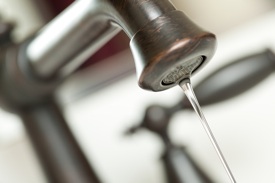Agriculture wastes 60% or 1,500 trillion liters, of the 2,500 trillion liters of water it uses each year.
Source
Agriculture is responsible for approximately 70 percent of water withdrawals, but 90 percent of the water consumption.
Source
In Nairobi urban poor pay 10 times more for water than in New York.
Source
Two-thirds of the world’s population is projected to face water scarcity by 2025, according to the United Nations.
Source
Landscaping accounts for about half the water Californians use at home.
Source
Water withdrawals in four States — California, Texas, Idaho, and Florida — accounted for more than one-fourth of all fresh and saline water withdrawn in the United States in 2005.
Source
Irrigation accounted for 85 percent of the 19,500 Mgal/d of water withdrawn in Idaho, and thermoelectric power accounted for 66 percent of the 18,300 Mgal/d withdrawn in Florida. (2005)
Source
More than half (53 percent) of the total withdrawals of 45,700 Mgal/d in California were for irrigation, and 28 percent were for thermoelectric power.(2005)
Source
From 2003-2005, the average water use for golf course irrigation in the U.S. was estimated to be 2,312,701 acrefeet per year. That equates to approximately 2.08 billion gallons of water per day for golf course irrigation in the U.S.
Source
The average American uses 100 gallons of water per day or 320 gallons used every day by the average family.
Source
Of the estimated 29 billion gallons of water used daily by households in the United States, more than 8.5 billion, or 30 percent, is devoted to outdoor water use.
Source
In dry climates, a household’s outdoor water use can be as high as 60 percent.
Source
A swimming pool naturally loses about 1,000 gallons (3,785 liters) a month to evaporation.
Source
The average pool takes 22,000 gallons of water to fill.
Source
The Las Vegas Strip accounts for just three percent of local water use, but 70 percent of the city’s water supply goes toward irrigating the 60-plus golf courses and the many residential lawns in the area.
Source
Producing a gallon (3.79 liters) of corn ethanol, consumes 170 gallons (644 liters) of water in total, from irrigation to final processing. The water requirement to make a gallon of regular gasoline is just five gallons (19 liters).
Source
Currently, the United States treats 70 percent of its wastewater, but only uses 4 percent of that amount.
Source
A family of four can save 14,000 to 25,000 gal/yr by switching from conventional toilets to the newer, more efficient ones.
Source
Overall, the world is using 9,087 billion cubic meters of water per year. China, India and the U.S. consumed the highest annual totals: 1,207 billion, 1,182 billion and 1,053 billion cubic meters, respectively.
Source
90% – 95% of pool and spa water lost to evaporation can be saved by installing a pool cover.
Source
A 7 mph wind at the surface of the pool can increase evaporation losses 300 percent.
Source
Washing your vehicle at home can use up to 148 gallons of water or more for one washing. Self-service car washes use roughly 12 gallons per vehicle in desert regions.
Source
Turfgrass remains the single largest irrigated crop in the United States, with an estimated 5–10 million hectares (68.3% of the total) around private residences.
Source
One broken sprinkler head could waste up to 25,000 gallons of water over a 6 month irrigation season.
Source
More than half of the U.S. population (54%) lives in cities that have vulnerable water supplies.
Source
Texas lost nearly $8 billion in agriculture in 2012 due to water shortages.
Source
A small bag of peanut M&M’s requires 300 gallons of water to produce.
Source
A person needs 20-50 liters (5.28-13.21 gallons) of water a day for basic needs.
Source
Water scarcity already affects more than 40 percent of the people on the planet.
Source
In 2030, 47% of world population will be living in areas of high water stress.
Source
Water withdrawals are predicted to increase by 50 percent by 2025 in developing countries and 18 percent in developed countries.
Source
15% of the world’s total water withdrawals used for energy production.
Source
Over the past 40 years the world’s population has doubled while water use has quadrupled.
Source
There are an estimated 700 water main breaks per day on average in the United States.
Source
30% of pipes in systems that deliver water to more than 100,000 people are between 40 and 80 years old.
Source
An estimated 90% of the 3 billion people expected to be added by 2050 will live in developing countries, many in regions without sustainable access to safe drinking water.
Source
1 pound of pork requires 576 gallons of water.
Source
1 pound of chicken requires 468 gallons of water.
Source
1 pound of rice requires 449 gallons of water.
Source
1 pound of wheat requires 132 gallons of water.
Source
1 pound of goat requires 127 gallons of water.
Source
1 pound of potatoes requires 119 gallons of water.
Source
1 pound of corn requires 108 gallons of water.
Source

